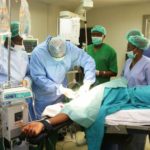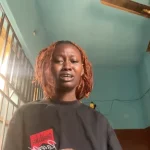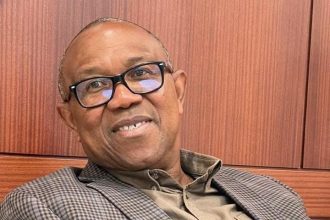President Donald Trump abruptly exited his daily White House press briefing Friday without taking a single question, after digging an increasingly deep hole over his comments about treating coronavirus patients with powerful disinfectants.
The event lasted just 22 minutes, with Trump sharing the stage with other officials instead of holding court for up to two hours as he has on occasion.
White House officials have reportedly begun discussing ways to curtail the President’s tole and cut back on daily briefings, according to four White House officials and Republicans close to the White House who spoke on condition of anonymity because they were not authorized to discuss the matter publicly.
Although the daily briefings are popular with his base, advisers worried that they may alienate other viewers as they often contain inaccurate information.
He did speak earlier in the day when he said he had been ‘sarcastic’ when he proposed treating coronavirus patients by injecting disinfectant.
Trump said he was just pitching the idea to reporters to ‘see what would happen’ – but then admitted he also spoke to government experts about it and they were exploring it.
A top scientific advisor, Dr Debbie Birx, was absent from the briefing – after Trump had directed comments about the bizarre treatments to her.
Birx did appear on Fox News earlier Friday, where she explained about Trump:
“When he gets new information, he likes to talk that throughout loud … I think he just saw the information at the time immediately before the press conference and he was still digesting.”
Trump’s quick exit allowed him and his team to avoid tough questions about the 50,000 Americans who have now died from the virus, another grim milestone.
It came despite him billing it on Twitter as a ‘press conference.’
Another dramatic factor was an internal struggle with the press. The White House had tried to bump CNN from its traditional front-row seat, only to be rebuffed by the White House Correspondents Association and individual reporters.
The matter even involved a reference to Secret Service agents who protect the president.
Yahoo News reported minutes before the briefing that ‘White House staff just came into the briefing room and informed the print pooler that they want them to swap seats w CNN.
That would move CNN to the back row from the front.’ The print pooler represents print and online organizations, and sits toward the back of the room.
However, after resistance from the print pool reporter, WHCA, and CNN, the White House-backed down.
It is the correspondents’ organization that assigns seats in the room, and that determined the new social distancing format that has a small number of reporters present during the daily briefings.
According to a report from the designated pooler, ‘Earlier today before the briefing, a White House official instructed the print pooler to take CNN’s seat in the briefing room because the seating would be swapped for the briefing.
Given the seating assignment is under the jurisdiction of the White House Correspondents’ Association, not the White House, the pooler refused to move.’
“The White House official then informed the print pooler swapping wasn’t an option and the Secret Service was involved. Again, the pooler refused to move, citing guidance from the WHCA. The briefing proceeded with both CNN and print pooler sitting in their respective assigned seats.”
However later Friday evening, the Secret Service denied being involved in any way. Another official confirmed their lack of involvement.
“The Secret Service tells the WHCA they were not involved whatsoever in this effort by the WH to change seating assignments,” according to the organization’s president.
Trump’s briefings usually involve tense exchanges with reporters, although the New York Times reported this week they are a highlight of his day during the virtual lockdown.
But the president was to face questions on a variety of difficult subjects.
A drug he has touted, hydroxychloroquine, has been the subject of some negative trial studies and warnings from government scientists. Georgia on Friday began relaxing











